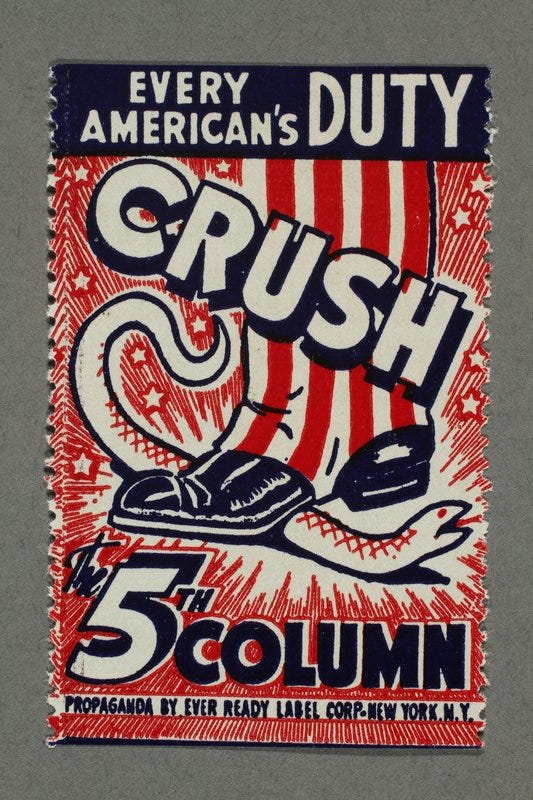Firehose #92: Snek Got Stepped
Also: Second Sunday Will Be Third-Sundayed, Because Mothers!
The image above comes care of beloved Fif’ listener/Yankee fan/bartender/artiste Craig Mahoney, and I just don’t know why you people keep sending me stuff like this…. Oh look, here’s a May 9 email from John S., for some reason wanting to pass along that “today…is the 270th anniversary of the slogan, ‘Join, or Die,’ d.b.a. ‘No Step on Snek,’” complete with link to the This Day in History Class podcast. Also … bootleg merch? It’s an honor just to be nominated….
Anyhoo, tomorrow is the second Sunday of the month, which usually means that we tape a probably-will-eventually-be-posted episode with a few hundred of our favorite paying customers, but since tomorrow is Mother’s Day, we are clearing the decks for the mothers and baby mamas in our lives, and booting the Zoom ritual to the Third Sunday, May 19th. To make up for the subsequent yawning chasm in some of your schedules, here’s maybe the most content-rich weekend email yet.
* Paying subscribers will recall that in Members Only #209, the Dangerously Dialoguing Dissident Michael Moynihan pushed back with two hands the accusation by Rising co-star and Israel/Gaza debate opponent Briahna Joy Gray that he had engaged in “open bigotry” when comparing potential new Palestinian residents of Israel to a theoretical immigration wave of Danes. Well, Brie Brie Joy has now clapped back, comparing Ol’ Hollywood’s locution with that of Ann Coulter recently telling Vivek Ramaswamy (veteran of Episode #411) that she wouldn’t vote for him “because you’re an Indian.” See Gray, next to Rising co-host Robby Soave (#332), pivot to Moyni-bigotry at around 4:50:
* Speaking of Moyni-Zionism, though I also included this in my midweek Fifth Column annual review, here he is last Saturday with Coleman Hughes (#121, #144, #181, #188, #201, #379, #412 & #442) on Comedy Cellar owner Noam Dworman’s Live From the Table podcast, talking “Campus Protests, Norman Finkelstein, Israel, The Atom Bomb, and More.” There are reportedly some Finkelstein impressions….
* Moar Noam: Our comedy/music pal went this week on The Reason Interview with Nick Gillespie (Special Dispatch #72, #379), to talk about “free speech, the history of comedy in Greenwich Village, anti-Semitism, and Islamophobia”:
* More Coleman: Young Mr. Hughes appeared on the podcast of SAPIR, a “quarterly journal of ideas for a thriving Jewish future,” with Editor in Chief Bret Stephens to talk about his March piece there, “Black Radicalism: Antisemitism runs deeper in the black radical tradition than many realize”:
* Glad (most of) y’all enjoyed the dulcet tones of dot-connector Jacob Siegel (#70, #193) in #454. His provocative July 2023 essay in Tablet, “End U.S. Aid to Israel” (co-written with Liel Leibovitz) will be discussed by yours truly in a Reason feature essay coming soon to a magazine stand near you. Theirs was cribbed by New York Times columnist Nicholas Kristof, responded to (in Tablet) by Sen. Ted Cruz (R – Texas), Rep. Ritchie Torres (D – N.Y.), and former diplomat Dennis Ross; and in Commentary by Eliott Abrams.
* Somewhere in that or another recent episode, I mentioned the amazing (and amazingly brutal-but-kinda-hilarious) animated version of “This Land Is Mine,” by Nina Paley. I’ll tell you some Wikipedia stuff about it after; watch it first:
So: 1) Video is from 2012. 2) It’s from an animated re-telling of the Book of Exodus that Paley released in 2018 called Seder-Masochism, which you can watch in full below. 3) The idea sprung in part from criticism of cultural appropriation that Paley received after making the 2008 film Sita Sings the Blues. Per the Wiki (most links/footnotes there de-linked):
Paley was criticized by some observers for co-opting the culture of India as an outsider, an assertion with which she strongly disagreed. A recurring theme among the negative comments was "how would you like it if people made a film about your religion?" Paley thought that she would enjoy watching any such film. Accepting this as a challenge, she turned to her own Jewish cultural heritage for her next project: a revisionist retelling of the story of Passover. She pored over the Book of Exodus, finding details that were not part of modern Jewish culture, for instance, that Moses's brother Aharon performed some of the acts that are commonly attributed to Moses, and that the Jews were killing each other during their 40 years "wandering" in the desert. For inspiration, she also read The Creation of Patriarchy by Gerda Lerner, and The Language of the Goddess by Marija Gimbutas. She concluded that the Book of Exodus represents the final defeat of goddess worship by the patriarchy that had been rising since the agricultural revolution.
Whole movie, though watch out for sneks!
* Let’s veer away from the Holy Land, and back into the media industry, which has seen an unusually rich amount of Fifdom-adjacent analyses of late. For instance, Kat Rosenfield (#448) had herself quite the week, writing in The Free Press that Kamala Harris’s vice presidency is a direct result of the fact that in 2020 “we were all insane;” revisiting on her own very subscribable Substack the also-in-2020 yet still hated-in-2024 Harper’s Letter on Free Speech and Open Debate, and then penning a very solid Boston Globe piece on how elites in journalism, government, and science utterly squandered public trust. Chonky excerpt:
These moments of lockstep ideological conformity among the sciences, the state, and the press are rare, but they are fertile ground for abuse of power by the people we trust to guide us.
During the satanic panic of the 1980s, experts testified — and journalists assured us — that secret cults of devil-worshippers were engaged in the sadistic serial torture of children all across America, right under our noses. During the COVID-19 pandemic, the expert class scolded us that masks were useless (until, suddenly, they were required by law), that the lab leak hypothesis was a racist conspiracy theory (until, suddenly, it was deemed likely to be true), and that any gathering of more than 10 people was an unconscionable risk (unless the gathering was a Black Lives Matter protest, in which case “the public health risks of not protesting to demand an end to systemic racism greatly exceed the harms of the virus,” as one public health expert put it). For the past few years, elementary school educators nationwide have been embroiled in a scandal over “whole language learning,” a literacy model that has been in use for decades despite its documented abysmal failure at actually teaching children to read. And just last month, a comprehensive review by British pediatrician Hilary Cass said that when it comes to gender-affirming medical care for children — whose efficacy countless people have been smeared as transphobic bigots for questioning — “we have no good evidence on the long-term outcomes.”
These very different cases have one crucial thing in common: A deliberate incuriousness spreads from the top down by experts who wield disproportionate influence over the national discourse and, by extension, people’s lives — influence that many believe it is their duty to exercise.
It’s not a coincidence that our current trust crisis corresponds with a growing belief among journalists that their job is not simply to report the news but to steer the moral compass of their audience. As memorably documented by NPR’s Uri Berliner in a recent piece for the Free Press, mistrust is a two-way street. The people who create our culture and lead our national conversations are suspicious at best and contemptuous at worst of ordinary people, who become distrustful in turn as they intuit, not incorrectly, that the folks in charge are not above trying to control their behavior. […]
At the risk of stating the obvious, a world in which expressing doubt about supposedly settled truths is algorithmically suppressed as “fake news” has terrible implications for the national discourse, for a culture of free expression, and for people who deserve the chance to consider a diverse range of ideas and make up their own minds. But this is also an outright dangerous state of affairs for the members of the expert class who have the propensity to fall into line rather than pursue unpopular lines of inquiry.
* Equally quoteworthy, though just not enough room here to go long (and also: the man refuses podcast invitations) is the great Jack Shafer in Politico Magazine detailing how the collapse of the media biz has gone hand in hand with journalism losing its swagger. Plenty of familiar names quoted or invoked there, including Nick Gillespie, Christopher Hitchens (S.D. #36), Nellie Bowles (#187), Bari Weiss (#89, #115, #159, #180 & #187), and Matt Taibbi (#226, #348).
* Speaking of Taibbi, he was rather bullish this week about New York Times Executive Editor Joe Kahn declaring to Semafor honcho Ben Smith (#125, #227, #404) that “The newsroom is not a safe space,” and that “To say that the threats of democracy are so great that the media is going to abandon its central role as a source of impartial information to help people vote — that’s essentially saying that the news media should become a propaganda arm for a single candidate, because we prefer that candidate’s agenda,” among other bracing slaps to the “moral clarity” crowd. Taibbi’s conclusion:
Maybe this stand will lead to a real turnaround, maybe it won’t. Either way, the period will be remembered as an object lesson in what happens to media organs once they cross over into the politics business. When the Times ran its famous piece about moving away from the “norms of objectivity” toward a more “oppositional” model over Trump seven years ago, the paper was clearly thinking more about the short-term benefits of jumping under the covers with the #Resistance than the problem of getting bedbugs out down the road. Kudos to Kahn for trying to restore some dignity to his staff. Now comes the hard part, making a play for independence stick.
* Our friend and Mike Pesca (#343, #418) also had a good one this week, about the ongoing travails and possible death spiral of National Public Radio. Excerpt:
Among the stories about white supremacy that aired in 2020 you’d find excellent discussions of economics, policing, and violence. But you’ll also find stories about taking the name Abraham Lincoln off of schools in order to combat white supremacy, how “Christian niceness is a product of whiteness, and it's just as deadly as any of the other manifestations of white supremacy”, a noose that was really a pull-tie, why certain signs held by white people at Black Lives Matter rallies “decenter the experience of Black people”, and how Doctors Without Borders “was built on a mindset of white supremacy". This last story, to NPR’s credit did include a quote from Africa Stewart, the president of Doctors Without Borders' U.S. board, who noted that she is the daughter of a Black Panther. There were stories about racist bird names and one offering a defense of looting. There was the story arguing that Asian students are "a mask that white privilege can wear in order to hide itself" which goes on to credulously quote a researcher who, in the face of overwhelming counter evidence declares that at Harvard “There is no evidence that there's a practice of anti-Asian discrimination."
* And what the hell, here’s a rant about the media just last night from Bill Maher. I don’t agree with all of it, and there’s isn’t a ton of comedy beyond a good Trump rally joke near the end, but there are some truth-darts:
* Oh hey, I (along with Producer Justin Zuckerman, Motion Graphic Designer Adani Samat, and freelancer Paul Detrick) received one of Reason’s 14 L.A. Press Club award nominations, for Best Activism Journalism Across Any Broadcast Media, on account of this:
* RIP Gen X music producer icon Steve Albini. Chicago legend, glorious/notorious prick, and one of the more unlikely interview subjects of our own Kmele Foster (go to the 10:40 mark):
* Speaking of Kamelly….
… you can also buy (cheaper!) tickets for that same day to see me and my Reason Roundtable colleagues do a live show in Washington, D.C. Other quality Reason events here.
* Comment of the Week comes from Dacia:
"Kaplan & Abernathy": A cool 70s throwback crime solving duo, Jake Siegal and Nick Offerman star as badass detectives thrown together by chance. Siegal stars as Ira Kaplan, a playful but brilliant NYC cop with a shady past and penchant for breaking rules to get the perp. Offerman is Sean Abernathy, a thrice-divorced spectrum-y rule-follower who prefers to work alone. When Abernathy's partner, Paul Guthrie (Will Arnett in flashbacks) dies mysteriously, PC Charlie Wornlove (Wanda Sykes, obvi) brings in Kaplan as a replacement. Between Kaplan's willingness to go over the line and Abernathy's by-the-book sensibilities, the pair find a middle ground, solving high crimes while working to avenge Guthrie's death.
Walkoff music was suggested by listener Tim:





Happy to help!
Megan McArdle's conversation with Russ Roberts about the Oedipus Trap (referenced in Kat's article) was one of the very best Econ Talks (econtalk.org/megan-mcardle-on-the-oedipus-trap/). I heard it just after I'd wrapped up listening to Emily Hanford's excellent reading wars series (also mentioned) for the second time and could not stop thinking about how perfectly it demonstrated the theory.